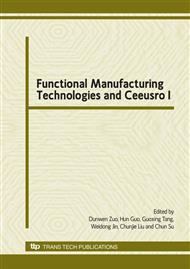p.463
p.468
p.472
p.477
p.481
p.485
p.490
p.494
p.499
A Study on the Intergenerational Succession of Family-Owned Businesses
Abstract:
The training of second generation of successor has been an important task for most family-owned businesses. With groping for many years, the family-owned businesses have searched out a particular model of succession. Transferring the leadership from fathers to sons is very common, with the incumbent and the successor also being initiatively. There results in double succession of property right and management right at the same time and concentration in succession time. In this paper the development process and the character of the succession for family-owned businesses have been analyzed and discussed, and this succession model is presented, which has the general character of family-owned businesses in China, with the particular character of Changzhou. The intergenerational succession is analyzed successfully by means of the model, and the result is validated by the family-owned businesses in Changzhou.
Info:
Periodical:
Pages:
481-484
Citation:
Online since:
January 2010
Price:
Сopyright:
© 2010 Trans Tech Publications Ltd. All Rights Reserved
Share:
Citation:


